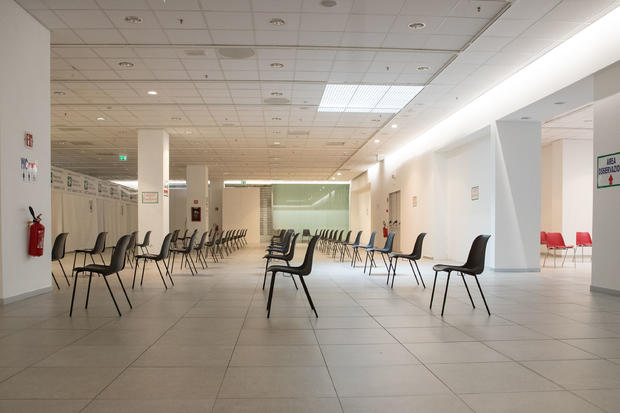COVID vaccine shortages, AstraZeneca suspensions and new variants prompt new lockdowns in Europe
Rome — Coronavirus vaccination efforts across Europe are lagging significantly behind the U.S., and with the number of new COVID-19 cases in some countries spiking, governments are making the difficult decision to impose new lockdowns.
When Italy became the first nation to impose a nationwide coronavirus lockdown a year ago, Italians came to their windows to sing songs and play instruments in solidarity. But as the country is gripped by a third wave of infections, CBS News correspondent Chris Livesay says the music has stopped.
He says it seems like only yesterday that he regained the freedom to sit outside at a café and order a cappuccino. Now cities across Italy are locking down again as the numbers of both new cases and deaths recorded daily climb. Germany, too, is facing the prospect of widespread lockdowns being extended by up to a month as infections rise.
New, more infectious variants of the virus and a shortage of vaccine doses are making matters worse, according to Italy's Deputy Health Minister Pierpaolo Sileri.
"We [have] less than 50% of the expected doses at the present time. But I think the same happened everywhere in Europe," Sileri told CBS News. "It's not an Italian problem. I think it's a European problem."
Vaccine shortages haven't been the only European problem. People have been letting their guard down, too, and the director of the U.S. Centers for Disease Control and Prevention cited Europe as an example this week, warning Americans not to do the same.
"They simply took their eye off the ball," the CDC's Dr. Rochelle Walensky said. "I'm pleading with you, for the sake of our nation's health, these should be warning signs for all of us."
To make matters worse, Italy can't currently even use the vaccine it has the most ready supply of. It joined the list this week of countries, mostly in Europe, temporarily suspending use of the Oxford-AstraZeneca vaccine after reports of patients dying of blood clots shortly after getting the shot.
Italy's national medicines authority, along with the pan-European Medicines Agency, the World Health Organization and British regulators have all said there's no evidence yet that the vaccine caused the clots — which number fewer than 40 among more than 17 million people to receive the shot in Europe.
The WHO reiterated on Wednesday that it was reviewing data, but "at this time, WHO considers that the benefits of the AstraZeneca vaccine outweigh its risks and recommends that vaccinations continue."
The Italian regulator has made it clear that the halt is strictly a temporary precaution. Like many EU nations, Italy may decide to re-evaluate later this week when the European Medicines Agency releases revised guidance after a review of data on AstraZeneca vaccinations.
But with some vaccination centers around the country left empty this week due to the decision, it has been just the latest setback in a country that's already suffered so much during the pandemic.
"We can't take much more of this," one Rome resident told CBS News on Wednesday, as his country suffers through its deepest recession since World War II.
More than 100,000 deaths have already been blamed on the coronavirus in Italy, and the country's military has gone from trucking away the dead, to inoculating the living. If only, the health ministry says, there was enough to go around.
Since the dawn of the pandemic, things that happen in Italy have had an eerie way of repeating themselves in the U.S.
As Italy grapples with a third wave and a vaccine shortage, however, the Health Ministry told Livesay that Americans should be grateful for the inoculation program's rapid roll-out at home.




